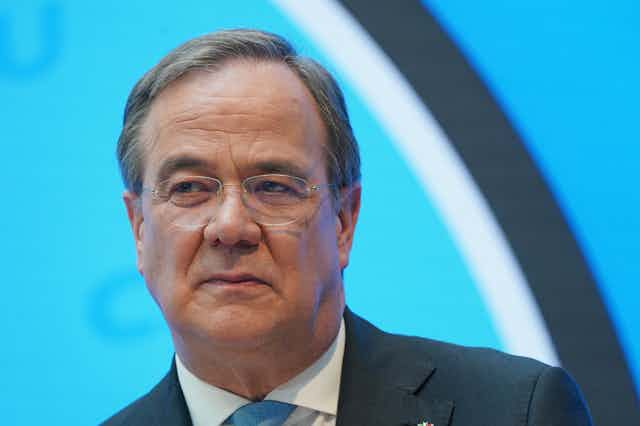After months of uncertainty, Germany’s Christian Democrats have finally chosen the man who will stand in September’s election to replace Angela Merkel as chancellor.
Armin Laschet is currently minister president (the head of government) of North Rhine Westphalia and has been leader of one of the two Christian Democratic parties - the Christian Democratic Union (CDU) - since Merkel stepped down from that role in January.
He was picked ahead of Markus Söder, who is head of the CDU’s sister party the Christian Social Union (CSU) and also Bavarian minister president. Söder had won support from a number of CDU heavyweights and pointed to numerous opinion polls showing that he had far greater public support than Laschet.
Indeed, just a few days before the decision was made, only 29% of Germans polled saw Laschet as suited to being chancellor. Söder had support from 63% of people in the same poll. Another survey suggested Laschet’s nomination could cost the party 98 seats. But given Laschet will be leading the party that has provided the chancellor for all but 20 years since 1949, he must surely be the front-runner to succeed Merkel.
Who is Laschet?
The 60-year-old Laschet has been consistently underestimated throughout his career, an experience he shares with Angela Merkel and even Helmut Kohl, both of whom overtook more highly-fancied colleagues for Germany’s top job.
In 2017, Laschet scored a surprise victory over a popular incumbent to become minister president of North Rhine Westphalia, the largest German state, and home to the industrial centre of the Ruhr, as well as major urban conurbations around Cologne and Düsseldorf. A former MEP, Laschet is avowedly pro-European and casts himself as a centrist, very much in the Merkelian mould. This was his successful pitch to the CDU when he was narrowly elected as party leader in January ahead of hardliner Friedrich Merz.
With his soft Rhinish regional accent, Laschet comes across as genial, if perhaps more a small-town mayor than a national leader. He has, however, proved a master of party management in the leadership contest, apparently contacting middle-ranking party officers individually to shore up support (something Kohl was famed for in his day).
Laschet can have a harder edge too. He takes a tough line on law and order issues in his home state and he clumsily blamed Bulgarians and Romanians for local outbreaks of COVID. In 2020, he consistently pushed for swifter relaxation of COVID restrictions, positioning himself against Merkel, and found himself criticised by her in March of this year for not implementing restrictions with sufficient rigour.
Laschet has also drawn criticism for foreign policy statements questioning Russia’s responsibility for the Salisbury attacks and supporting Bashar al-Assad’s regime in Syria. That said, foreign affairs has not yet been a major plank of Laschet’s political career and he is likely to pivot to the European mainstream if he takes on the role of national leader.
Why him?
The choice of Laschet over Söder is partly explained by the complex and sometimes challenging relationship between the CDU and the CSU. The CSU is the Bavarian wing of German Christian democracy and has been a forthright advocate for the interests of Bavaria – something that does not play well outside the state. On the two previous occasions (in 1980 and 2002) when the CSU has fielded the chancellor candidate, the party was defeated – something Laschet’s advocates often pointed out.
The two wings of German Christian democracy have also, most recently, clashed over migration policy. Back in 2018, a very public dispute played out between Merkel and Horst Seehofer, the then leader of the CSU and interior minister in her government, over the former’s open borders policy. The crisis blew over, and, interestingly, led to Söder becoming the CSU’s public face. From his new position, he pivoted towards a more centrist stance and was keen to emphasise his environmental credentials.

However, this was not enough to persuade the majority of the CDU’s executive body to endorse Söder as chancellor candidate. A sometimes-chaotic virtual meeting eventually saw 31 members vote for Laschet in a secret ballot. There were nine votes for Söder and six abstentions – so a good win for Laschet, if not a ringing endorsement.
Söder accepted the outcome rather begrudgingly the next day, with the CSU’s general secretary stating that Söder was still “the chancellor candidate of our hearts”. Some heavyweights had rowed in behind Söder – notably Reiner Haseloff, the minister president of eastern Saxony-Anhalt – but far more endorsed Laschet. There may have been concern about Söder’s rather dismissive, almost populist approach to party bodies (members of the CDU’s Präsidium, or core executive, were not amused to be compared to a smoke-filled room).
Will he make it to the top?
With only a few months to go before the election, the big question is now whether Laschet can win enough public support to become chancellor. The first poll after his nomination saw the Greens with a sudden, seven-point lead. The poll suggested that even if the CDU/CSU came first, there would be options that might see it cut out of government (a coalition between the Greens and multiple other parties could make up a bigger bloc).
At the start of the year, a CDU/CSU-Green coalition was felt a racing certainty, but Germany’s faltering vaccination programme, a scandal over corrupt procurement hitting CDU/CSU MPs, and Christian Democracy’s internal woes have badly affected its standing. Yet the climate is febrile, and the CDU/CSU may well gain ground back by September, especially if vaccination really takes off. German politics remains well worth watching, and it may just provide another understated, often-underestimated, centrist as the most important politician in the EU.

